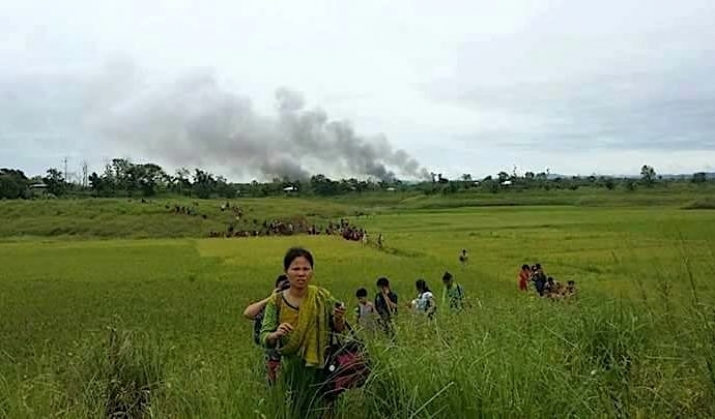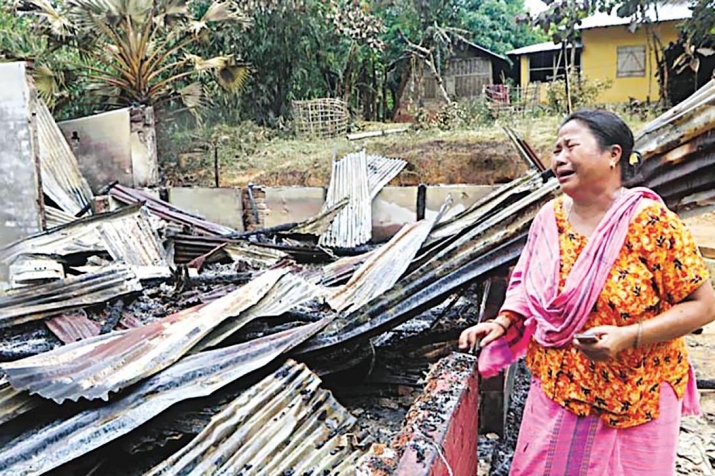NEWS
Hundreds of Homes of Indigenous Buddhists in Bangladesh Burned Down by Bengali Settlers
 Indigenous people flee attacks by Bengali Muslim settlers in Longadu on 2 June as smoke rises from their burning homes. From facebook.com
Indigenous people flee attacks by Bengali Muslim settlers in Longadu on 2 June as smoke rises from their burning homes. From facebook.comIndigenous Buddhist communities in Bangladesh’s Chittagong Hill Tracts (CHT)* have once again come under attack from Bengali Muslim settlers in the region. Local media reported that on 2 June, more than 200 homes of indigenous communities in Longadu, Rangamati Hill District, were torched, allegedly in the presence of army and police personnel. It was also reported that a 70-year-old woman, unable to flee, was burned alive in the attacks.
Hundreds of Bengali Muslim settlers, who were protesting the recent death of local youth leader Nurul Islam Nayan, a motorcycle taxi driver, set fire to houses in six villages. Nayan’s body was found on 1 June at a roadside and the settlers have accused members of the indigenous community of killing him, however police had yet to investigate the circumstances of his death.
Lonadgu Sadar Union chairman Kulin Mitra Chakma** stated that the attack took place despite assurances to local residents from security forces that no untoward incidents would take place. However, the settlers reportedly looted and burned down houses in the presence of army and police personnel. Chakma alleged the attack was pre-planned and that the protesters had been carrying bottles of petrol and kerosene. “If it was not a planned attack, they wouldn't have brought petrol and other flammable materials with them and burnt down our houses,” he said. His statement was confirmed by Abdul Barek Sarkar, a Bengali Muslim and chairman of neighboring Maini Union Parishad. (The Daily Star)
Army personnel beat a protestor condeming the attacks by Bengali Muslim settlers on
indigenous communities in CHT. From Miraz Mirazee Facebook
Seventy-year-old Nandi Bala Chakma, who returned from hiding in the jungle to find her house burned to ashes, also blamed the security forces: “The administration assured us that nothing untoward would happen. Then why did it happen to us? They had virtually killed us by destroying everything we had.” (The Daily Star)
Ananya Chakma from Longadu, a student at Dhaka University, expressed sadness, noting that while her classmates were heading home for the summer vacation, she had nowhere to go as her house had been destroyed and her parent were in hiding. “Where will I go now?” she asked. (The Daily Star)
The victims, most of whom have taken shelter in jungles, are angered by the repeated attacks and injustice and have rejected relief distributed by the administration. “My house was burnt twice, in 1989 and last week,” said Kalachan Chakma from the village of Manikchora. “I don’t want any relief, I want justice.” (The Daily Star)
News of the attacks was met with widespread condemnation as it spread over social media. The Human Rights Forum of Bangladesh, comprised of local rights groups, demanded an impartial investigation and punishment of the culprits. Another human rights organization, Ain o Salish Kendra, questioned how such acts could have been allowed to take place in the presence of police and army personnel. Amnesty International has also released a statement critical of the Bangladeshi security forces’ repeated oppression of indigenous people in CHT and urging Bangladesh’s government to punish the attackers and rehabilitate the victims.
 An indigenous woman in tears in front of the house in which her 70-year-old mother burned to death. Photo by Prabir Das. From thedailystar.net
An indigenous woman in tears in front of the house in which her 70-year-old mother burned to death. Photo by Prabir Das. From thedailystar.netThe 2 June incident is not the first in CHT. In 1998, 40 indigenous people in Longadu were killed in attacks. In 2010, more than 400 houses and Buddhist monasteries of indigenous communities were burned down in Rangamati. In each case, the attacks were allegedly supported by, or were carried out in the presence of, security forces. Protestors on social media compared the repeated attacks with the 1971 Bangladesh genocide by Pakistan’s military during Bangladesh’s bloody nine-month war for independence.
* The CHT are located in southeastern Bangladesh. The three hill districts are home to more than 11 indigenous communities, most of whom follow Theravada Buddhism.
** An elected political leader.
See more
Many houses torched in Rangamati (The Daily Star)
Arson at Chakma houses: Human Rights Forum demands attackers’ punishment (The Daily Star)
It's planned (The Daily Star)
Want justice, not relief (The Daily Star)
NHRC forms fact finding body over Rangamati arson attack (The Daily Star)
Six Langadu villages still deserted (New Age)
Woman dies as ethnic minority houses set ablaze (New Age)
1 killed as Adivasi villages torched in Langadu, probe body formed (Dhaka Tribune)
Bangali men flee Langadu fearing arrest (Dhaka Tribune)
Genocide in Chittagong Hill Tracts (angelfire.com)
Bangladesh: Investigate Vicious Mob Violence Against Indigenous Peoples (Amnesty International)
Related news from Buddhistdoor Global
Student Leader from Bangladesh Buddhist Community Allegedly Tortured to Death by Security Forces
Forced Religious Conversion of Children in Bangladesh’s Chittagong Hill Tracts on the Rise
Head Monk of Charitable Bangladeshi Monastery Receives Death Threats
Buddhist Monastery in Bangladesh Feeds Hundreds of Poor Families During Ramadan
Three Arrested for Murder of Buddhist Monk in Bangladesh
Related features from Buddhistdoor Global
Marginalized and Ignored: The Corrosion of Bangladeshi Minority-Government Relations
Saying Goodbye to My Mother: How Buddhists Hold Funeral Rites in Bangladesh














